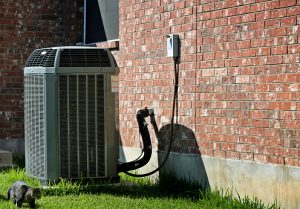 Keeping cool during the warmer months is essential to prevent illnesses such as heat cramps and heat exhaustion. But did you know you can get sick by trying to cool down? Unfortunately it’s true – if you’re cooped up in air conditioned (AC) environments you’re increasing your risk of a summertime cold.
Keeping cool during the warmer months is essential to prevent illnesses such as heat cramps and heat exhaustion. But did you know you can get sick by trying to cool down? Unfortunately it’s true – if you’re cooped up in air conditioned (AC) environments you’re increasing your risk of a summertime cold.
Whether you work in a super-chilled office space or you keep your home borderline frigid, cooling devices like an air conditioner can lead to what is commonly referred to as “sick building syndrome.”
What is sick building syndrome?
Advertisement
 Sick building syndrome refers to the residents of a building, such as an apartment or office, reporting acute health issues. Symptoms may include headache, irritation of the eyes, nose and mouth, dry cough, itchy skin and fatigue. These symptoms are not permanent and subside once individuals leave the building. There are many causes of sick building syndrome from poor ventilation, a stressful work environment, to air conditioning.
Sick building syndrome refers to the residents of a building, such as an apartment or office, reporting acute health issues. Symptoms may include headache, irritation of the eyes, nose and mouth, dry cough, itchy skin and fatigue. These symptoms are not permanent and subside once individuals leave the building. There are many causes of sick building syndrome from poor ventilation, a stressful work environment, to air conditioning.
In a French study it was found that 920 women who worked in air-conditioned buildings were more likely to fall ill or visit ear, nose and throat specialists. The Centers for Disease Control and Prevention report that healthy people are not immune to the effects of AC. They suggest that AC can lead to wheezing and even coughing.
Air conditioners can spread germs because there is no filter between indoor and outdoor air. Indoor air can be polluted, which makes it easier for the spread of mold, germs and even dander to float around. These indoor pollutants never get removed, and continue to circulate inside.
The cooling-heating cycle
 Another way we can get sick in the quest to keep cool is by continuously entering cold and hot environments. To understand this cycle it’s important to know how the body works.
Another way we can get sick in the quest to keep cool is by continuously entering cold and hot environments. To understand this cycle it’s important to know how the body works.
Our bodies are meant to remain around 98 degrees Fahrenheit (38 degrees Celsius). When we enter AC environments our bodies try to maintain this temperature. Initially our blood vessels will constrict and we may begin to shiver, which is the body’s attempt to stay warm. Blood vessels constrict in the nose and throat as those areas are where bacteria is most commonly found. This is the body’s way of preventing illness as well as maintaining heat as we exhale. Constricted blood vessels mean a drop in blood flow as well as illness-fighting white blood cells.
The fluctuations between hot and cold create a cycle that makes you prone to illness. If you do this frequently, your body has a difficult time adjusting to the change in temperature.
Tips to stay cool in the summer
It’s important to stay cool in the summer, but you don’t want to get sick while doing it. Here are some alternatives to air conditioning to keep you healthy and cool this summer.
- Wear cotton, loose-fitting clothing
- Stay hydrated
- Use a fan
- Take cool showers or baths
- Eat “cool” foods – cucumbers, watermelon, basically anything that contains high amounts of water.
These are just some ways to stay cool during hot months. If you are in a building or home with the air conditioning turned up, it may be a good idea to keep a sweater handy so that your body doesn’t have to cool down nearly as much. Layers are good to have because they can easily be removed to fit the change in temperatures.
Related Reading:
4 ways you’ll get sick this summer
Just because it’s sunny and warm outside doesn’t mean the threat of illness goes away. While the risk of catching the common cold might seem lower, there are other summertime health threats we should try to avoid. Here are four common illnesses you can get in summer and how to avoid them. Continue reading…
Advertisement
‘Cool’ health foods to eat this summer
Many varieties of foods start growing in the summery months not only making them fresher but they can be quite cooling so if you’re looking for foods to eat in the summer, try some of these healthy summer foods either on their own or together in some delicious recipes. Continue reading…
Sources:
http://www.medicinenet.com/script/main/art.asp?articlekey=52796
http://www.wsj.com/articles/SB10001424127887324139404579015062305117896
http://www.livestrong.com/article/160205-negative-health-effects-of-central-air-conditioning/
http://www.epa.gov/iaq/pdfs/sick_building_factsheet.pdf
http://www.huffingtonpost.ca/2015/07/20/air-conditioning-sick_n_7834628.html?ncid=tweetlnkushpmg00000033
